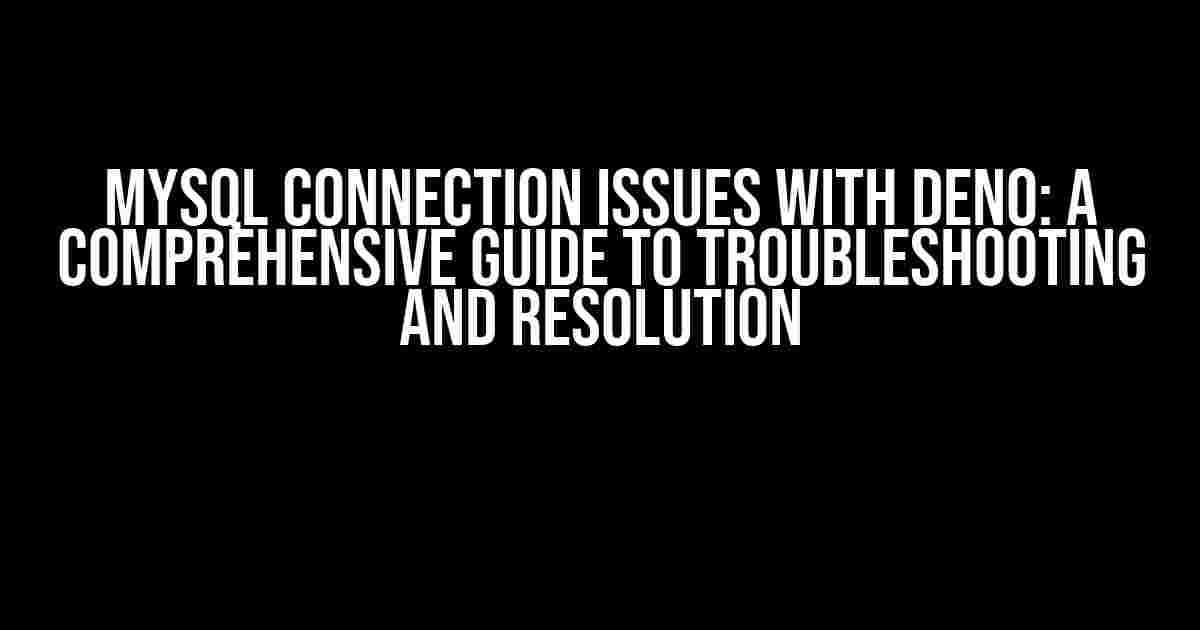Are you tired of dealing with MySQL connection issues in Deno? Do you find yourself scratching your head, wondering why your Deno application can’t seem to connect to your MySQL database? Fear not, dear developer, for we’ve got you covered! In this article, we’ll delve into the most common MySQL connection issues with Deno, and provide you with clear and direct instructions on how to troubleshoot and resolve them.
Understanding MySQL Connection Issues in Deno
Before we dive into the nitty-gritty of troubleshooting, it’s essential to understand the common causes of MySQL connection issues in Deno. Here are some of the most frequent culprits:
- Incorrect database credentials: Double-check your database username, password, and hostname to ensure they’re correct.
- Network connectivity issues: Verify that your Deno application can reach your MySQL database server.
- Database server configuration issues: Ensure that your MySQL database server is properly configured and running.
- Deno driver issues: Make sure you’re using the correct Deno driver for MySQL and that it’s up-to-date.
Common Error Messages and Their Solutions
In this section, we’ll explore some of the most common error messages you may encounter when dealing with MySQL connection issues in Deno, along with their solutions.
Error: ENOENT: no such file or directory
This error typically occurs when Deno can’t find the MySQL socket file. To resolve this issue, you can try the following:
import { connect } from 'https://deno.land/x/[email protected]/mod.ts';
const db = await connect({
hostname: 'localhost',
username: 'root',
password: 'password',
db: 'mydb',
socketPath: '/path/to/mysql.sock', // specify the correct socket path
});
Error: ECONNREFUSED: Connection refused
This error usually occurs when Deno can’t establish a connection to the MySQL database server. To resolve this issue, check the following:
- Verify that your MySQL database server is running and accepting connections.
- Check the database server’s firewall settings to ensure that they’re not blocking the connection.
- Ensure that the Deno application is running on the same network as the MySQL database server.
Error: ER_ACCESS_DENIED_ERROR: Access denied for user
This error typically occurs when the database credentials are incorrect. To resolve this issue, double-check your database username, password, and hostname to ensure they’re correct. You can also try resetting the password or creating a new user with the correct privileges.
Troubleshooting MySQL Connection Issues in Deno
In this section, we’ll provide you with a step-by-step guide on how to troubleshoot MySQL connection issues in Deno.
Step 1: Check the Deno Driver Version
Ensure that you’re using the latest version of the Deno driver for MySQL. You can check the version by running the following command:
deno run -A/--allow-all npm:[email protected]
Step 2: Verify Database Credentials
Double-check your database credentials to ensure they’re correct. You can do this by running the following command:
deno run -A/--allow-all mysql -h localhost -u root -p=password mydb
Step 3: Check Network Connectivity
Use a tool like `ping` or `nc` to verify that your Deno application can reach your MySQL database server.
ping mysql-server-ip-address
Step 4: Check Database Server Configuration
Ensure that your MySQL database server is properly configured and running. You can check the server status by running the following command:
mysql -h localhost -u root -p=password -e "SHOW VARIABLES LIKE '%version%'"
Best Practices for Avoiding MySQL Connection Issues in Deno
To avoid MySQL connection issues in Deno, follow these best practices:
| Best Practice | Description |
|---|---|
| Use environment variables for database credentials | Store your database credentials in environment variables to avoid hardcoding them in your code. |
| Implement connection pooling | Use a connection pool to manage your database connections and reduce the risk of connection issues. |
| Use a reliable Deno driver for MySQL | Choose a reliable and well-maintained Deno driver for MySQL to ensure that you’re using the latest features and bug fixes. |
| Regularly update your Deno and MySQL versions | Keep your Deno and MySQL versions up-to-date to ensure that you’re using the latest security patches and features. |
Conclusion
In conclusion, MySQL connection issues in Deno can be frustrating, but they’re not impossible to resolve. By following the troubleshooting steps and best practices outlined in this article, you’ll be well on your way to resolving even the most stubborn connection issues. Remember to stay calm, be patient, and don’t hesitate to seek help when needed. Happy coding!
Frequently Asked Question
Get answers to the most common MySQL connection issues with Deno! 💻
Why do I get a “Cannot find module ‘mysql'” error when trying to connect to MySQL with Deno?
You need to install the `deno-mysql` module specifically designed for Deno. Run `deno install –allow-net deno-mysql` to fix the issue! 💥
How do I specify the MySQL database host, username, and password in Deno?
Use the `createConnection` function and pass an options object with the required credentials, like this: `const conn = await mysql.createConnection({ host: ‘localhost’, user: ‘username’, password: ‘password’, database: ‘database_name’ });`. Easy peasy! 🎉
Why do I get a “Access denied for user” error when trying to connect to MySQL with Deno?
Double-check your MySQL username and password. Make sure you’re using the correct credentials, and that the user has the necessary permissions to access the database. If you’re still stuck, try creating a new user with the required privileges! 🔒
How do I handle connection errors when working with MySQL in Deno?
Use `try-catch` blocks to catch and handle any errors that might occur when connecting to MySQL. You can also use the `errno` and `code` properties to get more information about the error. For example: `try { … } catch (err) { console.log(err.errno, err.code); }`. Stay safe! 🛡️
Can I use an ORM like TypeORM with Deno to interact with MySQL?
Yes, you can! TypeORM supports Deno, and you can use it to interact with your MySQL database. Just install TypeORM using `deno install typeorm`, and follow the official documentation to get started! 🚀

